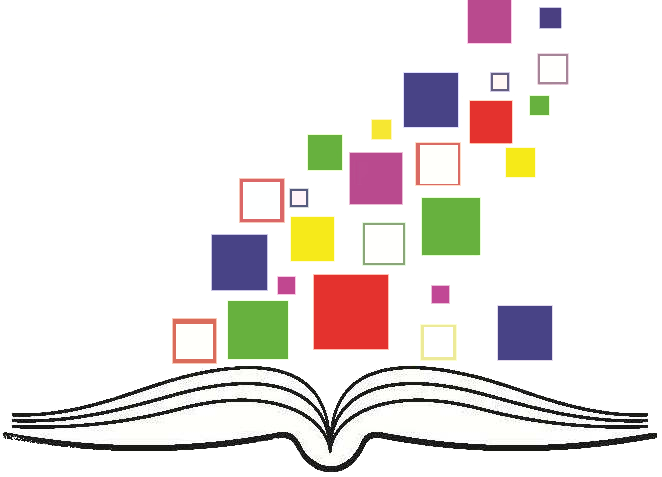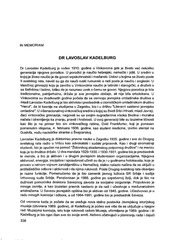Приказ основних података о документу
Dr Lavoslav Kadelburg
| dc.creator | Mihailović, Milica | |
| dc.date.accessioned | 2019-12-17T22:23:40Z | |
| dc.date.available | 2019-12-17T22:23:40Z | |
| dc.date.issued | 1997 | |
| dc.identifier.issn | 0353-0612 | |
| dc.identifier.uri | https://www.jevrejskadigitalnabiblioteka.rs/handle/123456789/183 | |
| dc.description.abstract | Dr Lavoslav Kadelburg je rođen 1910. godine u Vinkovcma gde je živelo već nekoliko generacija njegove porodice. U porodici je naučio hebrejski, nemački i jidiš. U sredini u kojoj je živeo naučio je da govori srpskohrvatski i mađarski. Uslovi u kojima se živelo posle II svetskog rata, naveli su ga da nauči ruski rumunski a radi posla je naučio i engleski. U klasičnoj gimnaziji koju je završio u Vinkovcima naučio je latinski i starogrčki, a družeći s sa Sefardima i ladino, toliko da je razumeo uvek o čemu se govori. Njegova porodica je bila tradicionalna, patrijarhalna, držala je sve jevrejske običaje, ali nije bila ortodoksna. U Vinkovcima su dvadesetih godina počela da se osnivaju jevrejska omladinska društva a mladi Lavoslav Kadelburg je bio aktivista i predsednik u cionističkom omladinskom društvu "Herut", da bi kasnije na studijama u Zagrebu, bio i u drštvu "Literarni sastanci jevrejske omladine". U višenacionalnoj vinkovačkoj sredini u kojoj su živeli Srbi i Hrvati, mladi Jevreji, đaci vinkovačke gimnazije, negovali su sa svojim sugrađanima visoka životna i moralna načela i stremljenja ka znanju, pravdi i hrabrosti. U ovoj generaciji bile su izuzetne ličnosti kao što je na primer bio sin vinkovačkog rabina, David Frankfurter, koji je ponesen pomenutim idejama, 4. februara 1936. godine, kao student medicine, izvršio atentat na Guslofa, vođu nacističke stranke u Švajcarskoj. Lavoslav Kadelburg je doktorirao pravne nauke u Zagrebu 1935. godine i sve do Drugog svetskog rata radio u Vršcu kao advokatski i sudski pripravnik. Kao i drugi siromašniji studenti, bio je upućen na pomoć "Židovskog akademskog potpornog društva" i na menzu koju je to društvo držalo. U dva mandata 1929-1930. i 1930-1931. godine bio je predsednik te menze, a bio je aktivan i u drugim jevrejskim studentskim organizacijama. Njegova aktivnost, energija, inicijativa i sposobnost učinili su da je i u godinama holokausta, koje je proveo u ratnom vojnom zarobljeništvu u Nemačkoj, stalno nalazio načina da se uključi u antifašističke odbore i aktivnosti i da njima rukovodi. Posle Drugog svetskog rata obavljao je razne funkcije. Pomenućemo da je bio zamenik javnog tužioca SR Srbije i sudija Vrhovnog suda Srbije. Penzionisan je 1966. godine po sopstvenoj želji, dok je bio na dužnosti pomoćnika direktora Saveznog zavoda za socijalno osiguranje. Proputovao je mnoge zemlje, a kao izuzetan pravnik nastavio je da radi i učestvuje u međunarodnim arbitražama. U Savezu jevrejskih opština bio je aktivan od 1945. godine. Učestvovao je u radu mnogih komisija i odbora, a od 1964-1991. godine bio je predsednik Saveza. Od vremena kada je počela da se uređuje nova stalna postavka Jevrejskog istorijskog muzeja, dr Kadelburg je počeo sve više da se uključuje u njegov rad. Muzejska komisija, telo koje rukovodi radom Muzeja, oformljena je 1969. godine i dr Kadelburg je bio njen član sve do svoje smrti... | sr |
| dc.description.abstract | Dr. Lavoslav Kadelburg was born in 1910 in Vinkovci, where his family lived for several generations. In his family, he learned Hebrew, German and Yiddish. In his surroundings, he learned Serbo-Croatian and Hungarian. The living conditions after World War Two led him to learn Russian and Romanian, and his business required the knowledge of English. In the classical grammar school, which he graduated from in Vinkovci, he learned Latin and Ancient Greek, and through his association with the Sephards he leamed enough Ladino to follow a conversation. His family was traditional, patriarchal, maintaining all the Jewish customs, but it was not an orthodox one. In the twenties when the Jewish youth societies began to appear in Vinkovci young Lavoslav Kadelburg became an activist and the president of Zionist youth society "Herut." During his studies in Zagreb, he joined the "The Jewish Youth Literary Meetings" society. In the multiethnic surroundings of Vinkovci where the Serbs and Croats mixed, young Jews, the pupils of Vinkovci grammar school, with their fellow citizens adhered to high ethical principles and cherished aspirations to knowledge, justice, and courage. Even in his early youth, Kadelburg was already showing the promise of an exceptional intellectual and many other pupils from the same class also appeared to be very outstanding personalities. We can mention that among them was David Frankfurter, the son of the Vinkovci rabbi, who as a medicine student, carried away by those very ideals, in February 1936 assassinated Gustloff, the leader of the Nazi party in Switzerland. In 1939 Ladislav Kadelburg received his doctorate in law in Zagreb and until World War Two worked in the town Vršac as a law clerk. Like other poor students, he also relied on the help of "The Jewish Academic Supporting Society" and the Mess sponsored by that society. During two terms, in 1929-1930 and 1930-1931, he was the Mess president and also active in other Jewish organizations. His activity, energy, initiative, and ability enabled him, even in the years of the Holocaust as a war prisoner in Germany, to find ways to participate in and lead various antifascist committees and organizations. After World War Two he held various high positions; among other things, he was a deputy public attorney of the Socialist Republic of Serbia and a judge of the Supreme Court of Serbia. He retired in 1966 by his own wish, while holding the position of the assistant manager of the Federal Social Security Institute. He traveled a lot, and as an exceptional jurist, he continued to work and was taking part in the international arbitration. In the Association of Jewish Communities, he was active from 1945 onward, participating in the work of many commissions and boards and from 1964 to 1991 he was president of the Association. Since the time when a new permanent display of the Jewish Historical Museum was being set up (opened in 1969) Dr. Kadelburg was more and more engaged in the Museums activities. The Museum Commission, a body managing the Museums activities, was one of its members till his death. | en |
| dc.language.iso | sr | sr |
| dc.publisher | Beograd : Savez jevrejskih opština Jugoslavije [Federation of Jewish Communitues in Jugoslavia] | sr |
| dc.rights | openAccess | sr |
| dc.rights.uri | https://creativecommons.org/licenses/by-nc-nd/4.0/ | |
| dc.source | Zbornik 7 : Studije, arhivska i memoarska građa o Jevrejima Jugoslavije, Jevrejski istorijski muzej - Beograd = Jewish studies 7 : Studies, archival and memorial materials (about Yugoslav Jews), Jewish historical museum - Belgrade | sr |
| dc.subject | Lavoslav Kadelburg (1910-1994) - biografija | sr |
| dc.subject | Lavoslav Kadelburg (1910-1994) - biography | sr |
| dc.title | Dr Lavoslav Kadelburg | sr |
| dc.type | article | sr |
| dc.rights.license | BY-NC-ND | sr |
| dcterms.abstract | Михаиловић, Милица; Др Лавослав Каделбург; Др Лавослав Каделбург; | |
| dcterms.abstract | Михаиловић, Милица; Др Лавослав Каделбург; Др Лавослав Каделбург; | |
| dc.rights.holder | Savez jevrejskih opština Srbije = Federation of Jewish Communities of Serbia | sr |
| dc.identifier.fulltext | http://jevrejskadigitalnabiblioteka.rs/bitstream/id/391/JIM0717INMEMORIAMDRLAVOSLAVKADELBURG.pdf | |
| dc.type.version | publishedVersion | sr |
| dc.citation.spage | 338 | |
| dc.citation.epage | 341 | |
| dc.citation.issue | 7 | |
| dc.description.other | Rubrika In memoriam. | |
| dc.identifier.rcub | https://hdl.handle.net/21.15107/rcub_jdb_183 |
Документи
Овај документ се појављује у следећим колекцијама
-
Lične i porodične priče [Personal and family stories]
-
Zbornik JIM 07 [Jewish Studies JHM 07]
Studije, arhivska i memoarska građa o Jevrejima Jugoslavije / Studies, archival and memorial materials about the Jews in Yugoslavia

